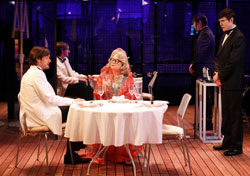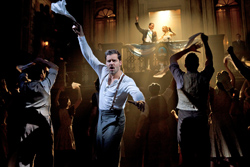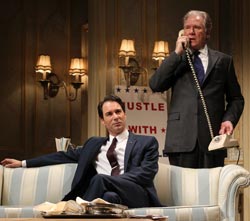Category: "Review"
Review: In Masks Outrageous and Austere
Apr 17th

Tennessee Williams certainly doesn’t make it easy to be generous.
The common perception about the legendary playwright’s later works is that they were sad reflections of his former glory, but they have also been unfairly maligned by unfeeling critics expecting another Streetcar or Cat on a Hot Tin Roof. But however generous one wants to be in assessing In Masks Outrageous and Austere, the playwright’s purportedly final work—he’s had more posthumous releases than Tupac Shakur—it’s impossible to ignore the fact that it’s an unholy mess.
It’s a beautifully staged unholy mess, though, as seen in this world premiere production directed by David Schweizer and starring Shirley Knight, whose half-century affiliation with the playwright goes back to the 1962 film Sweet Bird of Youth.
Unfinished at Williams’ death in 1983, the play is set on a sundeck facing the ocean that is being guarded by three mysterious sunglass-wearing, sharp-suited operatives code-named “Gideon.” They are either protecting or holding captive “Babe” (Knight), an elderly heiress of a chemical company, as well as her much younger lover Billy (Robert Beitzel, looking and acting like Ashton Kutcher) and Billy’s “secretary”/lover Jerry (Sam Underwood).
Among the other bizarre characters wandering throughout the proceedings are Mrs. Gorse-Bracken, a middle-aged matron (Alison Fraser) who sings opera when she’s not meddling in Babe’s affairs; her mute, growling African-American husband (Jermaine Miles) and his dwarf interpreter (Jonathan Kim); and a chambermaid (Pamela Shaw) and her macho, garage-mechanic boyfriend (Christopher Halladay).
The desperate Babe periodically checks in by phone with her support system, played on video by Buck Henry and Austin Pendleton. Otherwise the surreal action is nearly incomprehensible, with such plot elements as the matron’s unseemly obsession with her young, mute son (Connor Buckley), who she calls “Playboy.”
“Latent incest on top of everything else?” rightly complains the aggrieved Babe. “My God, if this were theater, I’d think it a metaphor for the idiocy of existence.”
It is theater, and it probably is a metaphor, one of many awkward ones cluttering up this work that is sorely lacking the poetic language for which the playwright was renowned. Fans, however, will enjoy spotting the similarities and references, both overt and oblique, to such earlier works as The Milk Train Doesn’t Stop Here Anymore.
Director Schweizer has delivered an elaborately glossy production, with the theater outfitted with wraparound video screens and transparent side booths in which the peripheral action takes place. But for all the care lavished on the staging, not to mention the fine performances by Knight and Fraser as the dueling grande dames, there’s no disguising the fact that this final work from one of our greatest playwrights is little more than an unfortunate, if at times admittedly fascinating, curiosity.
Culture Project, 45 Bleecker St. 866-811-4111. www.cultureproject.org. Through May 26.
Review: Evita
Apr 13th

“Tasteful” is not a word that springs to mind when thinking about Eva Peron, and it shouldn’t when it comes to Andrew Lloyd Webber and Tim Rice’s musical Evita either. But that’s exactly the quality that best describes the new Broadway revival, the first since the work’s premiere. Understated and underwhelming, it sacrifices the original’s bombast and flash for a substance that isn’t really there. Hal Prince’s now legendary 1979 production certainly had its flaws, but being boring wasn’t one of them.
This version staged by Michael Grandage and first seen on the West End in 2006 begins with somber film footage of Eva’s coffin being paraded through the streets of Buenos Aires, and the funereal tone never wavers from there.
Argentine actress Elena Rogers makes her Broadway debut in the title role, and it is not an unalloyed triumph. The Olivier-Award winning performer, who garnered raves for her London portrayal, lacks the charisma, or “star quality,” as the show puts it, to fully convince as the galvanizing Evita. She’s credible in dramatic terms, and more than credible when it comes to the dancing. But her singing becomes shrill and grating in her higher register, and she doesn’t have the pipes to do justice to a song like “Don’t Cry for Me, Argentina.”
Pop star Ricky Martin is the clear box-office draw here. But unlike the original’s Mandy Patinkin, who infused his every number with a biting sarcasm, his charming but uncharismatic Che seems more irritated than outraged. Not surprisingly, the singer handles the vocals with ease and, much to the delight of his female fans, he engages in some vigorously sexy dancing. In this version, the character is an everyman rather than the Che Guevara of Prince’s staging, but while that interpolation didn’t make any particular sense, it did add a historical frisson that is lacking here.
Also disappointing is Michael Cerveris as Peron. The normally compelling actor makes surprisingly little impact, although he does bring a suave sexiness to the role.
Grandage’s pageant-like staging of the sung-through piece moves well enough, and Rob Ashford’s tango-influenced choreography provides plenty of eye candy. But the main appeal of this show is its score--featuring such classic numbers as “Oh What a Circus,” “A New Argentina,” “Buenos Aires” and others—and it doesn’t come across with much impact with this version’s tinny orchestrations and wan singing. And the addition of “You Must Love Me,” written for the unfortunate 1996 film version starring Madonna, doesn’t help much.
Marquis Theatre, 1535 Broadway. 800-745-3000. www.ticketmaster.com.
Review: Magic/Bird
Apr 12th

If you’re going to write a play about two legendary sports figures it would help if more than one of them was interesting. Such is the dilemma of Eric Simonson’s second attempt to lure reluctant middle-aged men to Broadway. But unlike last season’s Lombardi, which presented a compelling portrait of a truly larger-than-life figure, Magic/Bird has a central emptiness at its core.
The play concerns the basketball players Larry Bird and Earvin “Magic” Johnson, whose professional rivalry and complicated personal relationship fascinated sports fans during the 1980s. Adding innate drama to the story, of course, is Johnson’s 1991 announcement that he is HIV-positive.
That powerful scene opens the play, which relates its story in flashback form. The evening certainly covers all the bases—sorry, wrong sports metaphor—in its depiction of, among other things, the several championship games fought between the Lakers and the Celtics; the friendship that resulted when a reluctant Johnson traveled at Bird’s insistence to his home town of French Lick, Indiana to film a now-classic Converse commercial; and their playing together in the 1992 Olympics in what became known as the “Dream Team.”
Bird was notorious for being an anti-social and uncommunicative figure, which the play captures all too well. Although the character’s loquaciousness provides some comic mileage, a little goes a long way and it ultimately becomes simply boring.
Although physically suitable for their roles and displaying some impressive hoops chops, Kevin Daniels and Tug Coker are underwhelming as Magic and Bird respectively. Daniels delivers an ingratiating performance, but is understandably at a loss to convey Magic’s megawatt charisma. And Coker is unable to make Bird’s recessive nature sufficiently intriguing.
Far better are the supporting players in their multiple roles. Peter Scolari entertainingly essays such famous coaches as Red Auerbach and Pat Riley; Deirdre O’Connell is a hoot as Bird’s mother, who hosts Magic for lunch in the evening’s most entertaining scene; and Francois Battiste gets laughs every time he imitates Bryant Gumbel’s distinctive high-pitched voice.
The staging by Thomas Kail features some clever touches, such as introducing the cast in sports-team style at the play’s beginning and the use of real-life footage to complement the onstage action. And the period atmosphere is appropriately with songs by the likes of Blondie and Huey Lewis and the News.
Magic/Bird is being presented in association with the NBA, which should certainly help it in terms of cross-promotional branding. And since non-basketball fans are likely to be left cold by this wan drama, it will need all the help it can get.
Longacre Theatre, 220 W. 48th St. 212-239-6200. www.telecharge.com.
Review: End of the Rainbow
Apr 3rd

It may be time to let Judy Garland rest in peace. The beloved entertainer has been a never-ending subject of fascination since her untimely death. Since then, she’s been portrayed on stage, film and a seemingly endless series of cabaret acts. The latest example of this biographical necrophilia is End of the Rainbow, a London import starring Tracie Bennett that has just opened for a Broadway run.
Peter Quilter’s musical drama, staged by Terry Johnson, is set in December, 1968, just a few months before Garland died. It takes place at London’s Ritz Hotel, where the entertainer is preparing for a series of nightclub concerts that was intended to be yet another comeback.
She’s accompanied by her fifth and much younger husband Mickey Deans (Tom Pelphrey), who is managing her career while attempting to keep her away from the booze and pills that are hastening her decline. Offering moral support is Anthony (a fine Michael Cumpsty), her deeply devoted, longtime pianist.
The portrait of Garland that the play paints is a by now familiar one. She cracks ribald jokes; curses like a longshoreman; and throws temper tantrums whenever she’s feeling deprived of the substances with which she’s been self-medicating for years.
Oh, and she sings. The rear wall of the lavish hotel room periodically disappears to reveal a five-piece band as Bennett bursts into such signature Garland numbers as “The Man That Got Away,” “Come Rain or Come Shine” and, of course, “Over the Rainbow.”
The Olivier Award-winning won well deserved acclaim across the pond for her performance. She bears a certain resemblance both physically and vocally to Garland—the singer’s late career hairstyle and onstage costuming have been faithfully recreated—and she inhabits Garland’s neurotic, wickedly funny personality in fully convincing fashion. It’s a bravura turn, even if the sheer number of Garland impersonators that have come along in the last few decades inevitably reduces it of some of its freshness.
Unfortunately, the evening’s one-note nature defeats her best efforts. Repetitive and plodding, the play feels like little more than an extended, morbid vignette interrupted by songs we’ve heard many times before. It ultimately reduces rather than sheds light on this complex personality and show business legend.
Belasco Theatre, 111 W. 44th St. 212-239-6200. www.telecharge.com.
Review: Gore Vidal's The Best Man
Apr 2nd

You may be wondering why Gore Vidal’s politically-themed drama The Best Man needed another revival a mere twelve years after its last Broadway outing. The better question is why hasn’t it been done in the interim, considering that we’ve had endured several highly contentious elections? Fortunately, it can now be seen in a wildly entertaining, star-studded production with the newly possessory title Gore Vidal’s The Best Man.
While this 1960 play is dated in some of its details—although not by much, considering how much talk there’s been lately about a possible brokered Republican convention—its portrait of political chicanery could not be more contemporary.
What makes the play work so well more than a half-century after it premiered is its crackling dialogue, which produces more laughs than most outright comedies. And while contemporary audiences are less likely to spot the obvious parallels between its characters and such historical figures as Nixon, Kennedy and Adlai Stevenson, they’ll certainly recognize the venality and ruthlessness on display.
The plot concerns the battle between two candidates for their party’s 1960 presidential nomination just before and during a convention. The opponents are William Russell (John Larroquette), a highly principled, intellectual Secretary of State with a propensity for womanizing, and the young, handsome Senator Joseph Cantwell (Eric McCormack), who will use any methods at his disposal to smear his opponents.
And he has a real smoking gun to use against Russell, in the form of a confidential medical report detailing a past nervous breakdown and psychological problems. So when Cantwell’s former army buddy (Jefferson Mays) shows up with information apparently proving a past homosexual dalliance, Russell is faced with the ethical dilemma or whether or not to use it in retaliation.
Spurring him on to counterattack with full force is the plain-talking, former President Hockstader (James Earl Jones), who keeps both men guessing as to who he’ll finally endorse.
Other characters figuring in the past-paced action include Russell’s loyal wife Alice (Candice Bergen), willing to put up appearances even though the marriage is all but over; political grande dame Sue-Ellen Gamadge (Angela Lansbury), who’s seen it all; Russell’s loyal campaign manager (Michael McKean) and Cantwell’s flighty, Southern belle wife (Kerry Butler).
Director Michael Wilson’s atmospheric production has the theater festooned with political banners, television screens showing fake news footage; and a commentator delivering his broadcasts from one of the side boxes.
More importantly, he delivers a fast-paced, galvanizing staging that features one of the best ensemble casts seen on Broadway in recent years. This all-star assemblage of superb performers produces a visceral excitement, and for the most part they don’t disappoint. The old pros Jones and Lansbury show that they can still command the stage in their eighties, with the former particularly powerful as the dying ex-president; Larroquette, usually seen in smarmier roles, is very effective as the principled, joke-cracking Russell; a de-glamorized Bergen is touchingly sympathetic as the publicity-averse wife; and McCormack, although not quite convincing at first, gets stronger as the evening progresses. And veteran character actor Dakin Matthews makes the most of his brief scenes as a befuddled senator.
This is a superb revival of a play that only seems to get more and more relevant every four years. It should be mandatory viewing before Election Day.
Gerald Schoenfeld Theatre, 236 W. 45th St. www.thebestmanonbroadway.com. Through July 8.